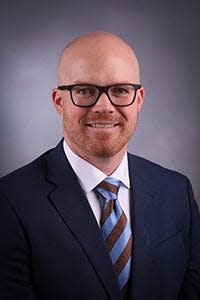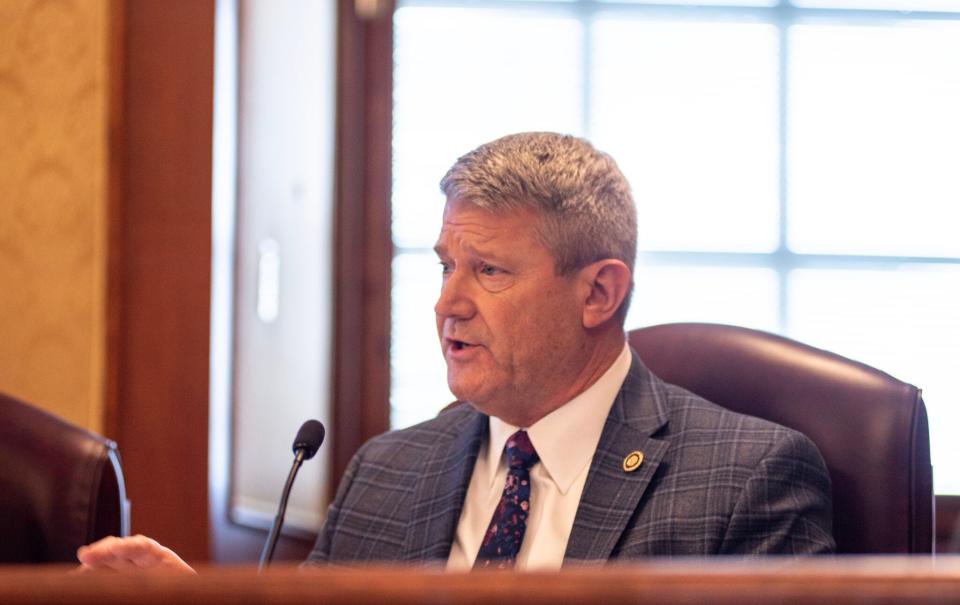MO lawmaker floats plan to block student access to social media at school in grades 6-12
- Oops!Something went wrong.Please try again later.
A legislative proposal that would require Missouri schools to block students' access to social media platforms in grades 6-12, unless it was part of a lesson plan, received a tepid response Wednesday from the Select Committee on Empowering Missouri Parents and Children.
Filed by state Sen. Travis Fitzwater, a Republican from Holts Summit, Senate Bill 976 called for the state Department of Elementary and Secondary Education to create a model curriculum to teach social media safety instruction.
If approved as written, districts will be required to teach students in grades 6-12 about social media and internet safety including the negative effects on mental health, how to report suspicious behavior, and the permanency of sharing materials online.

"There is a kind of tendency to swing this pendulum towards regulating the tech companies ... but I think what's maybe more impactful is just giving kids information, giving them training, giving them an understanding of the ins and outs of social media at an earlier age, putting it in front of them because it is so prevalent," Fitzwater said.
He said there is a need to talk to students, in a more formal way, about "what is going on with social media and how it's impacting them."
There was no direct opposition to that portion in the hearing but questions were raised about districts prohibiting students in grades 6-12 from accessing social media platforms in school, except if expressly directed by a teacher to do so for educational purposes.
Fitzwater's proposal would also require districts to develop a policy that limits students' internet access to age-appropriate subject matter and prohibits them from accessing websites that do no protect against the disclosure, use or dissemination of students' personal information.
State Sen. Lauren Arthur, a Democrat from Kansas City, said the proposal does not go far enough.
"I actually take a more restrictive view. I think social media has done a lot of harm to kids, and we haven't even fully realized the impact that it will have on our society," Arthur said.
Arthur asked Fitzwater if he envisioned each student receiving the training annually and which school department or type of teacher would be responsible.
She also questioned the caveat in Fitzwater's proposal that would allow students to access social media platforms if it was part of a specific lesson.
"I know teachers are very creative and that is probably a great way to engage students, based on their interests," she said. "But I'm trying to imagine a lesson that would ... be appropriate that would involve social media."
State Sen. Doug Beck, a Democrat from Affton, spoke after Arthur and said his position, surprisingly, is the opposite. A former Affton school board member, he said that district implemented successful infrastructure to guide internet usage.

"Some folks wanted to close everything down where it was not being able to be used for anything," said Beck, the assistant minority floor leader. "I've always been the person that wants to say 'Let's leave it open and then close it down as you need to."
Beck said "not all individuals" will abuse the access. "I like the media literacy, I like some of the things (in the bill) but I'm not sure about the 'shalls' at the end."
More: File under 'generational shift.' Gen Z, millennials patronize libraries more than retirees
He said there are "good ideas" in the proposal but also may be unintended consequences. "You're also taking away the ability of the school board to be able to decide on their internet policy."
Fitzwater said he was open to revising that part of the bill. "It's all negotiable."
He also acknowledged that he filed a dichotomous bill.
The first half proposed creating a STEM Career Awareness Activity Fund to help districts increase students' ability to explore jobs in science, technology, engineering and math.
That part of the bill received strong support from committee members. Education and business leaders championed the idea in their testimony at the hearing.
Fitzwater said the goal is to expose students to more career options in STEM fields earlier in school, when they have time to explore different paths. "Opening up some resources in these specific areas where there is a huge need in our economy makes a lot of sense."
This article originally appeared on Springfield News-Leader: Missouri lawmaker wants to block access to social media at schools

